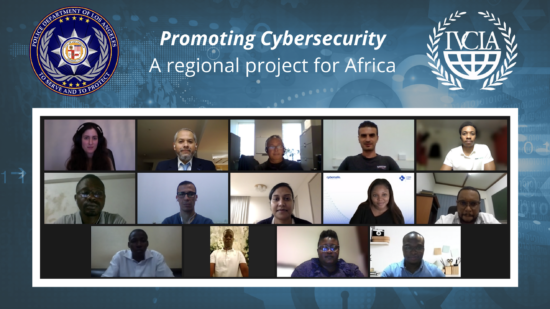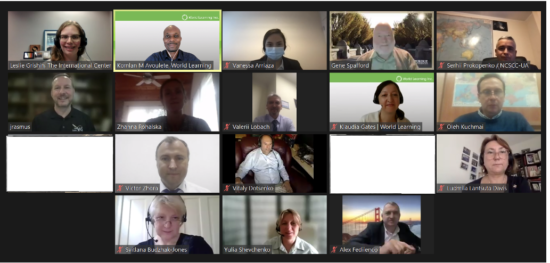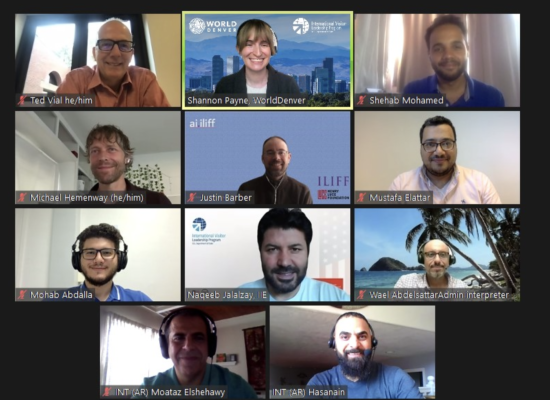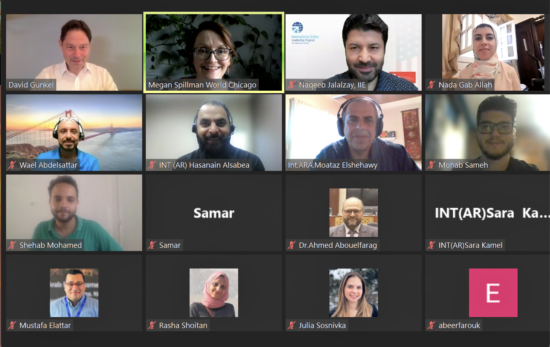Compiled by Carla Picasso, Communications Intern, Global Ties U.S.
October is Cybersecurity Awareness Month, and to celebrate, we asked our Community Based-Members to share how exchanges like the International Visitor Leadership Program (IVLP) can help build partnerships in the field of cybersecurity and artificial intelligence. As our world becomes increasingly more digitized, cybersecurity is a growing concern for individuals, organizations, and nations. Below, Global Ties Network partners discuss how IVLP exchanges create new conversations, connections, and future collaboration, plus why they believe exchange matters for global security.
Promoting Cybersecurity: A Regional Project for Africa
NPA: Meridian International Center
In September 2021, the International Visitors Council of Los Angeles and Iowa International Center hosted an IVLP project focused on Cybersecurity and its implementation in Africa. Through virtual meetings with U.S. experts like the Los Angeles Police Department (LAPD), international visitors gained ideas, insights, and confidence to tackle new challenges.
International Visitors Council of Los Angeles

Cybercrime is a growing, highly successful and profitable global industry that affects us all. With an international network involved, protecting against cyber-attacks requires global dialogue. IVCLA arranged a virtual meeting on this important topic for an International Visitors Leadership Program (IVLP) group from Africa. Participants who were cybersecurity professionals from Algeria, Benin, the Democratic Republic of the Congo, Eswatini, Kenya, Liberia, Mali, Mauritius, Namibia, Nigeria, Togo, and Zimbabwe met virtually with the Los Angeles Police Department (LAPD) to learn how LAPD’s Cyber Crimes Unit prevents and responds to Cybersecurity threats.
Detective Trevor Larson and Senior Systems Analyst David Nuno, shared LAPD’s investigative methods for local cybercrime and the role of the Cybercrimes Task Force. They explained that with the size and reach of the internet, it is impossible to fully investigate Cybercrime. They described the important role of LAPD’s Cybersecurity Awareness Program stressing how implementing educational programming is vital in making sure users are aware of phishing scams and encouraging them to better protect their credentials. Education can be one of the best ways to limit the threat of cybercrimes.
They also discussed the LAPD Cybercrimes Task Force, which investigates local cybercrimes when they occur. The visitors were curious about the way IP addresses can be tracked and how different jurisdictions are involved. Detective Larson explained that a plug-in from a third-party vendor helps identify and provide analysis of suspicious phishing emails, so users can perform these analyses on their own. Once analysis is complete, LAPD handles incident response for emails that are deemed malicious. Detective Larson also said complications arise when an IP address is outside of their jurisdiction such as out of state or out of the country, in which case tracking and policing require cooperation with other governmental entities. Senior Systems Analyst David Nuno described it as an “uphill battle” against malicious emails.
These types of international cybersecurity projects are crucial, as cyber threats have increased at an alarming rate since the COVID-19 outbreak. Both the officers and the visitors expressed hope that with more people involved in cybersecurity and in by building awareness, they can better ensure the safety of internet users. IVCLA was proud to foster this international exchange between IVLP participants and their professional counterparts in Los Angeles. —Janet Elliott, President & CEO
Iowa International Center
In September 2021, Iowa International Center (IIC) and Meridian International Center virtually welcomed 16 international visitors through the International Visitor Leadership Program (IVLP). The program, “Promoting Cybersecurity: A Regional Project for Africa,” invited cybersecurity professionals to explore various industry topics that spotlight cooperation for a safer cyberspace environment and highlighted global collaboration.
Cybersecurity attacks are seemingly everywhere. By sharing international ideas and processes, it can help combat many cyberattacks. One participant, Jerry Kabema, an IT specialist and tech entrepreneur from the Democratic Republic of the Congo, said, “International perspectives are indispensable. Global collaboration will lighten the task of every country to reduce cyberattacks.”
Another participant, David Mawazo, a cybersecurity analyst from Kenya, discussed his work to strengthen alliances in other countries by building personal and professional relationships with people from the program working toward promoting cybersecurity in Africa. “The IVLP program provides a platform to formulate partnerships and collaboration avenues, and this session was no exception,” stated David.
Collaboration allows international exchange about cybersecurity policy, education, and other tools or processes to counter cyber threats. Although only able to meet virtually, presentations from the program inspired another participant, Foldestine Paye, who said he felt more equipped to promote cybersecurity awareness in his country. As a technologist, researcher, and cybersecurity expert from Liberia, Foldestine plans to create change using his cybersecurity book, “Be A Good Digital Citizen,” and proposing new policies that would create a website to report cybercrime cases in Liberia and technical training to judges and youth.
Through this virtual program, Iowa International Center saw meaningful connections being built through passionate discussions and sincere interest. As one participant, Jennita Appanah Appayya, an information security consultant from Mauritius, said, “Countries alone cannot fight against these types of threats. International collaboration is essential to the whole process.” —Kassi Bailey, International Programs Director
Cybersecurity Policy and Practices
NPA: World Learning
The International Center

Photo courtesy of World Learning
The International Center was pleased to virtually welcome an International Visitor Leadership Program (IVLP) group from Ukraine titled Cybersecurity Policy and Practices. This virtual project examined best practices in U.S. cybersecurity policy and strategy with the goal of strengthening the cybersecurity framework and capabilities in Ukraine and improving resilience of critical infrastructure at the national and sectoral levels.
During their virtual visit to Indianapolis and West Lafayette, Indiana, international visitors connected with speakers from The Center for Education and Research in Information Assurance and Security (CERIAS), a cross-cutting institute at Purdue University and the world’s foremost interdisciplinary academic center for cyber and cyber-physical systems. CERIAS is home to more than a hundred researchers addressing issues of security, privacy, resiliency, trusted electronics, autonomy and explainable artificial intelligence.
During the virtual meeting, CERIAS speakers discussed issues of cyber workforce development and higher education’s role in engaging with the industry to protect critical infrastructure. The sharing of experiences of the speakers’ prior visits to Ukraine made for an instantaneous connection that is often so hard to accomplish in these virtual meetings. We hope that this session will lead to further collaboration.
Since 2019, The International Center has welcomed an increased number of IVLP groups focusing on cybersecurity related topics. CERIAS continues to be wonderful community partners and have connected with multiple IVLP groups over the past few years, both in-person and virtually. We are proud to highlight Indiana’s many cyber resources and are grateful to Hoosiers taking time to connect with the groups. —Leslie Grishin, International Visitor Programs Manager
Artificial Intelligence
NPA: Institute of International Education (IIE)
WorldDenver and WorldChicago reflect on hosting a September 2021 IVLP exchange focused on artificial intelligence (AI) and how the virtual meetings provided leaders in the United States and Egypt with opportunities to build knowledge, explore challenges, and discuss applications for AI.
WorldDenver

IVLP leaders from Egypt connect with U.S. counterparts during a virtual meeting with WorldDenver. Photo provided by WorldDenver
On September 7, 2021, WorldDenver partnered with the Institute of International Education to host a virtual International Visitor Leadership Program (IVLP) project on Artificial Intelligence (AI). The participants included eight Egyptian government and academic leaders working in AI, interested in ways to better incorporate AI into the Egyptian government and economy.
As part of this project, WorldDenver arranged a meeting with the Artificial Intelligence Institute at the Iliff School of Theology in Denver, known as ai.iliff. ai.iliff focuses on the social and cultural impacts of technology and the building of more responsible AI. Their activities include industry gatherings and dialogue; research projects on the relationship between humans and machines; and partnerships with companies and organizations to embed ethical practices into the full lifecycle of AI product development and use.
The dialogue between the IVLP participants and ai.iliff focused on questions of ethics in AI. The U.S. and Egyptian participants shared opportunities and challenges in their field, dissecting topics such as bias in facial recognition, cultural differences in machine learning, and data citizenship in an increasingly online and interconnected world.
What stood out to me most in facilitating this session was the way that all of the participants made space for each other to speak as equals. IVLP participants comfortably posed challenging questions to the team at ai.iliff, while the ai.iliff team asked specific questions about research that the Egyptian participants mentioned during their introductions. In the virtual environment, it can sometimes feel like an extra challenge to create a two-way, mutually beneficial exchange; yet this one-hour conversation ended with ideas for future collaboration.
As the host, I felt honored just to be present and know that we help these kinds of conversations take place—that, because of this virtual IVLP, AI leaders in the United States and Egypt now have new or renewed ideas about their field and future research. WorldDenver is thankful for the opportunity to host this group, and we look forward to learning how their IVLP experience influences their work moving forward! —Shannon Payne, Program Coordinator
WorldChicago

Photo provided by WorldChicago
WorldChicago was excited to host the International Visitor Leadership Program (IVLP) project “Artificial Intelligence” with the Institute of International Education (IIE) in September. The speakers appreciated hearing about policy initiatives in Egypt, and it was an opportunity for me as well, to reflect on the impact that the internet has on all of us.
What stood out to me was a story from one of the participants who shared how her children use technology and interact with machines. This inspired a group conversation about etiquette and whether or not to say thank you during an exchange with a machine. Do we need to thank machines? Her perspective as an expert in her field as well as her perspective as a parent watching the impact of technology on her family was fascinating. It made me consider the guidance that I provide to my son too, and as one of the speakers mentioned, we all have a responsibility to be informed about the impact of technology in our lives and homes. —Megan Spillman, IVLP Program Manager
